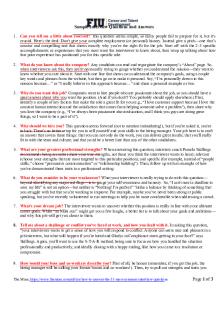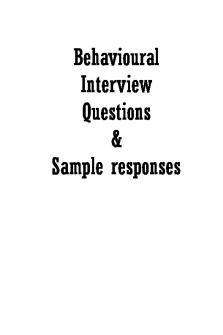Dialysis RD Interview sample questions PDF

| Title | Dialysis RD Interview sample questions |
|---|---|
| Course | Nutrition & Disease |
| Institution | Hunter College CUNY |
| Pages | 2 |
| File Size | 70.2 KB |
| File Type | |
| Total Downloads | 12 |
| Total Views | 139 |
Summary
interview w/ sample questions...
Description
Varamo 1 Donna Varamo NUTR 746: Nutrition and Disease Dr. Janet Kolmer Grommet 3 November 2020 Field-based Assignment: Chronic Renal Disease Introduction Marie Ruggles, MS, RD, CN, CDE is a registered dietitian who works in the New Hyde Park Dialysis Center in New Hyde Park, NY. Marie spent the majority of her career as an integrative and functional medicine dietitian, however, approximately 5 years ago she began working with dialysis patients. The New Hyde Park Dialysis Center is an outpatient center that has a patient census of 175 individuals in the unit. There are a total of 24 available chairs and 7 shifts per day. Marie works as an in-center dietitian, however, the center provides both in-center dialysis, peritoneal dialysis and outpatient home dialysis services. Nutrition Assessment Marie works part time as a renal nutritionist and she typically sees 24 patients during 3 shifts. When new patients are admitted to the unit, she performs a very basic dietary assessment during the initial nutrition assessment by conducting a brief dietary history interview. She also asks questions to assess the patient’s living situation to determine whether the patient has dental care, who primarily cooks in the household, and who primarily grocery shops in the household. At the dialysis unit, lab work is performed once a month and she makes nutritional recommendations based on the results. She does not use anthropometric data such as BMI at the site. Diagnosis Although the dietitians at the New Hyde Park Dialysis Center do not formally write PES statements, typical behavioral-environmental issues that Marie encounters in the patient population in this dialysis unit include food and nutrition related knowledge deficits, selfmonitoring deficits, and limited adherence to nutrition related recommendations. Marie noticed that many of the patients at the dialysis center have hypertension that is managed with medication instead of lifestyle and nutritional interventions. Marie’s strong integrative and functional nutrition background allows her to look at her patients in a holistic manner. She contributes many of her patient’s diabetes diagnoses to the lack of management of the many biochemical imbalances that her patients have, especially regarding hypertension. Intervention (Planning and Implementation) Marie generally does not assist in establishing individualized patient-centered goals as part of a care plan. If a patient does have diabetes, then she may help him or her establish patient-centered goals, however this is not a common practice that she does during counseling. Some of the most problematic nutritional issues that she encounters in the patient population at the dialysis unit include the management of phosphorus, potassium, and albumin. Common oral nutritional supplements that are prescribed are protein calorie supplements. The two most common renal-related medications that are prescribed to the patients in this dialysis
Varamo 2 unit include phosphate binders and Veltassa. Phosphate binders prevent the body from absorbing excess phosphorus by promoting phosphorus excretion through the feces. Veltassa is used to treat elevated potassium levels by binding to potassium within the digestive tract and promoting potassium excretion through the feces. Monitoring and Evaluation The most common monthly laboratory tests that are performed for patients in this dialysis unit include albumin, potassium, calcium, phosphorus, hemoglobin, and hemoglobin A1c. Glucose levels are assessed every 4 months. The laboratory data from these tests are provided to patients in the form at a “report card” every month. The report card contains the types of lab tests that were performed and the respective values. The patient is able to see the previous month’s lab values so that they can see what labs have improved or worsened. Team meetings are conducted once a month to discuss treatment options for unstable patients such as patients who are being repeatedly hospitalized, malnourished, or decompensating. Quality control meetings are also conducted on a monthly basis to evaluate patient satisfaction, evaluate resource utilization, measure morbidity and mortality, and evaluate policies, procedures, and practices among staff. Conclusion A renal nutritionist is a crucial and unique member of the healthcare team of a dialysis unit. Counseling and monitoring patients who have a lifelong commitment to dialysis is a rewarding experience, however, the repetitiveness of the practice offers little room for creativity. I feel that the caseload for a renal nutritionist may be overwhelming and lengthy, especially since there are 7 different shifts per day. I am also surprised that the counseling during the sessions is extremely limited, especially since the most popular behavioral diagnoses are food and nutrition related knowledge deficits, self-monitoring deficits, and limited adherence to nutrition related recommendations. I would suspect that more time would be spent teaching patients on what foods to increase and what foods to avoid to maintain their kidney function and prevent deterioration. I was also suspecting team meetings to discuss unstable patients would occur every other week rather than only once a month. Overall, this interview experience was beneficial in learning the typical caseload and experiences of a renal nutritionist working in a dialysis unit....
Similar Free PDFs

Interview questions
- 5 Pages

Interview Questions
- 1 Pages

Interview questions
- 1 Pages

Sample Health History Interview
- 9 Pages

Sample Interview Protocol Form
- 4 Pages

Interview questions
- 2 Pages

Interview Questions
- 3 Pages

Interview Questions
- 1 Pages

TD Interview Questions
- 4 Pages

Interview questions and notes
- 5 Pages
Popular Institutions
- Tinajero National High School - Annex
- Politeknik Caltex Riau
- Yokohama City University
- SGT University
- University of Al-Qadisiyah
- Divine Word College of Vigan
- Techniek College Rotterdam
- Universidade de Santiago
- Universiti Teknologi MARA Cawangan Johor Kampus Pasir Gudang
- Poltekkes Kemenkes Yogyakarta
- Baguio City National High School
- Colegio san marcos
- preparatoria uno
- Centro de Bachillerato Tecnológico Industrial y de Servicios No. 107
- Dalian Maritime University
- Quang Trung Secondary School
- Colegio Tecnológico en Informática
- Corporación Regional de Educación Superior
- Grupo CEDVA
- Dar Al Uloom University
- Centro de Estudios Preuniversitarios de la Universidad Nacional de Ingeniería
- 上智大学
- Aakash International School, Nuna Majara
- San Felipe Neri Catholic School
- Kang Chiao International School - New Taipei City
- Misamis Occidental National High School
- Institución Educativa Escuela Normal Juan Ladrilleros
- Kolehiyo ng Pantukan
- Batanes State College
- Instituto Continental
- Sekolah Menengah Kejuruan Kesehatan Kaltara (Tarakan)
- Colegio de La Inmaculada Concepcion - Cebu





